
Each of us is capable of coming up with that one brilliant idea that will take the world by storm and change everything in the process. So, if you want to become an entrepreneur and you don’t have a concrete idea of what to do, the next step is to narrow down the possibilities a bit. This article provides a broad overview of various types of businesses you can set up as an entrepreneur. I did a lot of research on this topic and I extracted more than 350 entrepreneurship business examples and ideas for starting a new venture. Click on the category in the table below to jump straight to that category and read more examples.
What is entrepreneurship, and what does entrepreneurship actually mean?
Entrepreneurship is the process of designing, launching, and running a new business or enterprise. Individuals who are entrepreneurial are typically characterized as being innovative, risk-taking, and willing to take on challenges. The concept of entrepreneurship has been around for centuries, but it was only in the late 18th and early 19th centuries that economists and other thinkers began to really focus on it as a separate field of study. In the years since then, entrepreneurship has become an essential and central part of many economies. Regardless of how it is defined, entrepreneurship is generally considered to be a positive force in the economy. Entrepreneurship is often associated with innovation, creativity, and the ability to create new jobs and businesses. It can also be a driver of economic growth. And now let’s look at all the major types of entrepreneurship with examples for each case.
To truly get a handle on entrepreneurship, you need to consider its two main components. First, there are different kinds of entrepreneurship, each with its own style and way of doing things. And second, these entrepreneurial businesses can happen in all sorts of industries. It’s about who you are as an entrepreneur and where you choose to make your mark. So we have:
No matter the specific style of entrepreneurship, most entrepreneurs will generally align with one of two broad categories: small business entrepreneurship or large business entrepreneurship. This tends to reflect the entrepreneur’s aspirations, resources, and their business’s size and scale.
- In a small business entrepreneurship, the focus is often local, with personalised service and deep community ties. The bakery on your street corner is a great example. The baker knows his customers by name, understands their preferences, and might even adjust his menu based on their feedback. These entrepreneurs are often deeply embedded in their local community and economy.
- In contrast, a large business entrepreneurship is about scale and widespread impact. These entrepreneurs aim to create businesses that reach beyond local communities, often spanning across countries or even globally. An example is a multinational corporation like Amazon. Jeff Bezos started Amazon with the goal of it being “the world’s most customer-centric company,” aiming to serve customers globally rather than in just one local community.
While these two types might seem different, they both involve the same core entrepreneurial principles: spotting opportunities, being resourceful, and creating value. The difference lies in the scale of their ambition and operation.
Types of entrepreneurship with examples:
- Innovative Entrepreneurship: These entrepreneurs introduce new ideas or improve existing ones. Apple’s Steve Jobs, with the iPhone, transformed mobile technology.
- Hustler Entrepreneurship: These entrepreneurs are hard workers, gradually building their business from the ground up. An example is the owner of a local restaurant who started as a food truck and expanded over years.
- Scalable entrepreneurship refers to a style of entrepreneurship where the goal is to rapidly grow the business. Scalable entrepreneurs often start with a unique, innovative idea that has the potential to serve a large, often global, market. They typically seek venture capital to help accelerate the business’s growth. A few examples would be Google, Facebook or Uber. In each example, the entrepreneurs started with an idea that could serve a large market, sought venture capital to grow quickly, and scaled their businesses to serve customers worldwide.
- Imitative Entrepreneurship: These entrepreneurs adapt successful business models to new markets or environments. For instance, someone might take the concept of Uber and introduce it in a city where it doesn’t exist.
- Research-Based Entrepreneurship: These entrepreneurs often come from academic backgrounds and leverage their research into a business. Biotech startups developing new medical treatments are examples.
- Buy-to-Sell Entrepreneurship: These entrepreneurs start or buy businesses with the goal of selling them at a profit. For example, someone might buy a struggling store, improve it, and sell it for profit.
- Franchise Entrepreneurship: These entrepreneurs adopt a tried-and-tested business model from a franchisor and replicate it. Think of your local McDonald’s or Subway franchise owner.
- Lifestyle Entrepreneurship: These entrepreneurs build a business around their personal interests or lifestyle. An example could be a travel blogger who earns through advertising and sponsored content.
- Serial Entrepreneurship: These entrepreneurs love the thrill of starting new businesses. Once one business is established, they’re off to start another. Richard Branson, founder of the Virgin Group, is a good example with his multiple ventures across different industries.
- Social Media Entrepreneurship: These entrepreneurs use social media platforms to build their business. Successful YouTubers, Instagram influencers, and TikTokers fall in this category.
- Intrapreneurship: These are employees who think and act like entrepreneurs within a company, often driving new innovations or spin-off divisions. An example is Ken Kutaragi at Sony, often called the “father of the PlayStation.”
- Mumpreneur/Dadpreneur: These are mothers or fathers who start businesses, often from home, to balance work with childcare. An example might be a parent setting up a children’s clothing line.
Entrepreneurship business examples for different industries:
| Entrepreneurship business examples: | Category or Types |
| content creation, website development, social media management, video creation | Online Businesses |
| bakery, farms, juice bar, artisanal beer shop, cupcakes & biscuit shop | Food Industry |
| house cleaning, pool care, pet sitting, garden & lawn landscaping | Home Service |
| personal fitness trainer, cooking trainer, dance teacher, diet planner | Training & Personal Training |
| cildren’s party organizer, senior care business, tech training, home retrofitting | Childcare & Senior Care |
| hair stylist, make-up artist, mobile disc jockey, escape room business | Event Based & Personal Care |
| solar energy consultant, personal organizer, wordpress consultancy | Consultancy Types |
| organic food shop, baby clothing line, customized gift shop | Retail Industry |
| 3d printing business, candle manufacturer, embroiderer business | Manufacturing Industry |
| community tour guide, travel vlogging, airbnb hosting, souvenir shop | Tourism Type |
| car wash, bycicle rental, grocery transportation, car storage | Transportation Industry |
| finance blogging, tax preparation service, stock market research website | Financial Services |
| water proofing services, roof maintenance & repair, junk removal, cctv installation | Construction & Engineering |
| tiny home builder, composting business, environmental blog, green florist | Environmental & Sustainability |
Click on any category above to read more examples.
1. Entrepreneurship business examples for online businesses

An online business entrepreneur is someone who creates and runs an online business and is typically someone who is innovative and creative. Experts believe that you need to have a good understanding of technology and how to use it to your advantage in order to succeed in this kind of environment. There are a few key characteristics that are common among successful online business entrepreneurs. First, they are passionate about their business idea and are willing to put in the hard work to make it a success. Second, they are often very good at marketing and promoting their business, as this is essential for attracting customers and making sales. Third, when starting a new business, making mistakes is inevitable. But what separates successful entrepreneurs from those who fail is the ability to learn from those mistakes. So if you want to be a successful entrepreneur, remember that mistakes are part of the journey. Embrace them, learn from them and get more and more experience that can be applied to future endeavors.

Here are some entrepreneurship business examples: translation firm, content creation business, social media management company, SEO company, video editing company, talent recruiting firm, website development business, voice-over creation company, marketing company, vending machine business, affiliate marketing business, aerial photography, advertising company, phone apps building company, website flipping business, YouTube channel creator, content strategy company, custom t-shirt business, podcast network, dropshipping, pet influencer business, web design & development company, Etsy shop, virtual assistant, graphic designer business, IT system consultant business, video creation company, brand ambassador business, digital agency.
2. Entrepreneurship business examples in the food industry:

A food business entrepreneur is an individual who owns and operates a food-related business. Food business entrepreneurs are responsible for all aspects of their businesses, from concept and menu development to marketing and financial management. They must have experience working with food, and be creative and passionate about food in order to succeed in this competitive industry.

Here are a few entrepreneurship business examples: themed restaurant, gourmet popcorn shop, coffee shop, bakery, farms, juice bar, ice cream shop, catering, homemade jam jellies or pickles, nut butter business, artisanal beer shop, chocolate shop, cupcakes & biscuit shop, mobile food van, fast food business, bread & pastries shop, honey shop, fruit and vegetable mart, herbs & spices store, themed pub, frozen yogurt store, aquaponics farm, personal chef.
3. Entrepreneurship business examples in the home services category:

A home services entrepreneur is someone who owns and operates a business that provides services to homeowners. Home service entrepreneurs typically have experience in one or more trades, such as plumbing, electrical work, carpentry, or painting. Some home service entrepreneurs start their own businesses, while others work for existing companies.
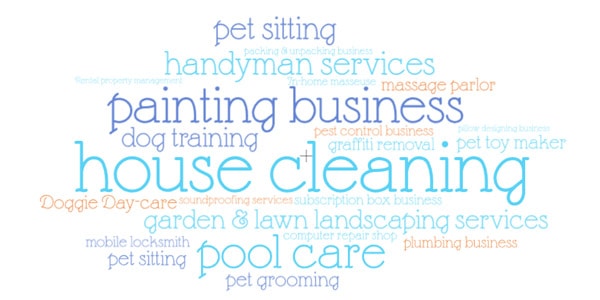
Here are some entrepreneurship business examples: house cleaning, garden & lawn landscaping services, painting business, handyman services, pool care, pet sitting, dog training, Doggie Day-care, pet grooming, pet toy maker, massage parlor, subscription box business, plumbing business, pest control business, mobile locksmith, graffiti removal, pet sitting, packing & unpacking business, computer repair shop, Rental property management, soundproofing services, In-home masseuse, pillow designing business.
4. Entrepreneurship business examples for the training / personal training type:

These types of entrepreneurs are those who create and deliver programs that train people on how to become better at something specific. They typically work with a small number of clients and often build long-term relationships with them in order to help them achieve their goals. They usually have a deep understanding of their field, a lot of experience, and are able to translate that knowledge into actionable steps that ordinary people can take to improve their performance.

Here are a few entrepreneurship business examples: personal fitness trainer, cooking trainer, dance teacher, diet planner, homeschooling service, teaching your hobby, language translation business, employee training business, online video courses, test prepping, sewing classes, arts & music teacher, sports coach, fashion design courses, stress management courses, sales training courses, sewing classes, remote tech support business, public speaker, team building business, life coach, meditation instructor, online dating consultant, gaming coach.
5. Entrepreneurship business examples in the childcare & senior care industry:

These types of entrepreneurs often have a passion for working with children and a desire to provide quality care for families and the elderly. They may also have a background in early childhood education or child development. Childcare businesses are booming in the United States, as more and more parents are returning to work after having children. The demand for quality childcare is high, and entrepreneurs who can provide this service are in a great position to succeed.

Here are a few entrepreneurship business examples: nanny, night nanny, children’s party organizer, senior care business, after-school tutoring club, children with special needs daycare business, baby nursery business, retirement community, home retrofitting, mobile salon for the elderly, senior exercise classes, senior travel group business, selling or storing possessions for the elderly, tech training, wheelchair manufacturing, errand services business, chiropractor.
6. Entrepreneurship business examples for the event based & personal care types:

An event planning entrepreneur is someone who plans and organizes events for a living. This can include everything from weddings and corporate functions to birthday parties and other private gatherings. Event planning entrepreneurs must be organized and detail-oriented, and they must have a good working knowledge of the various aspects of event planning, such as catering, decoration, and entertainment. A personal care entrepreneur is someone who develops and sells products and services that help people with their personal care needs. This can include anything from skincare and haircare products to fitness and wellness services. If you’re interested in becoming a personal care entrepreneur, you’ll need to be creative, driven, and passionate about helping people improve their appearance and well-being. Personal care entrepreneurs often have a passion for the products they sell and a strong commitment to providing quality customer service.
 Here are a few entrepreneurship business examples: hair stylist, make-up artist, wedding photo & video, virtual events business, rentals for weddings business, cloth alteration business, event planner, mobile disc jockey, greeting card business, cake decorator business, lights and sound service provider, customized gift business, corporate event planner business, outdoor events planner, party supply rental company, organize & manage tours for musicians, exhibition planner, career expo organizer, fashion show planner, festival planner, tattoo parlor, acupuncturist, escape room business.
Here are a few entrepreneurship business examples: hair stylist, make-up artist, wedding photo & video, virtual events business, rentals for weddings business, cloth alteration business, event planner, mobile disc jockey, greeting card business, cake decorator business, lights and sound service provider, customized gift business, corporate event planner business, outdoor events planner, party supply rental company, organize & manage tours for musicians, exhibition planner, career expo organizer, fashion show planner, festival planner, tattoo parlor, acupuncturist, escape room business.
7. Entrepreneurship business examples for the consultancy type

A consultant entrepreneur is an individual who provides professional advice and assistance to people or businesses. To be successful they should have a lot of experience in their practiced field. They may work with businesses of all sizes, but typically focus on small and medium-sized businesses. As a consultant, they offer advice and guidance on a wide range of business topics, from marketing and sales to finance and operations. In many cases, they act as a sounding board, providing objective feedback and helping to develop strategies for improvement.

Here are a few entrepreneurship business examples: interior decorator, solar energy consultant, personal organizer, yoga instructor, marketing consultancy, business management consultancy, environmental consultancy, nutritionist, personal investigation business, business plan consulting, small business consultancy, childbirth education business, scholarship consulting service, property consultant, SEO consultancy business, UX and UI designing consultancy, WordPress consultancy business, paid advertising consultancy, Shopify consultancy, amazon FBA consultancy, e-commerce implementation consultancy business, tax consultancy, risk management consultancy, Instagram consulting, online security consultancy.
8. Entrepreneurship business examples in the retail industry:

A retail entrepreneur is someone who owns and operates a retail business. Retail businesses are businesses that sell products or services to customers through a physical storefront or online store. Retail entrepreneurship is a risky business venture, as it requires a large investment of capital to open and maintain a retail store. Retail entrepreneurs must also be able to effectively manage their inventory, staff, and finances in order to be successful. However, experience pays off, and the rewards of owning a successful retail business can be great, as retail entrepreneurs have the potential to earn a significant income and build a valuable asset.
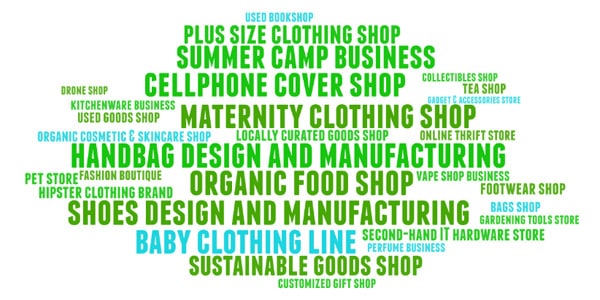
Here are a few entrepreneurship business examples: organic food shop, handbag design and manufacturing, shoes design and manufacturing, maternity clothing shop, cellphone cover shop, baby clothing line, summer camp business, sustainable goods shop, plus size clothing shop, locally curated goods shop, organic cosmetic & skincare shop, used goods shop, online thrift store, vape shop business, fashion boutique, used bookshop, collectibles shop, customized gift shop, second-hand IT hardware store, pet store, kitchenware business, drone shop, perfume business, bags shop, footwear shop, gadget & accessories store, gardening tools store, tea shop, hipster clothing brand.
9. Entrepreneurship business examples for the manufacturing type:

A manufacturing entrepreneur is a business owner who is responsible for the creation and production of new products or services. This type of entrepreneur typically has a strong technical background, a lot of experience with physical products, and is able to utilize new technologies to create innovative solutions to problems. In many cases, manufacturing entrepreneurs are able to bring their products to market quickly and efficiently, thanks to their intimate knowledge of the manufacturing process.
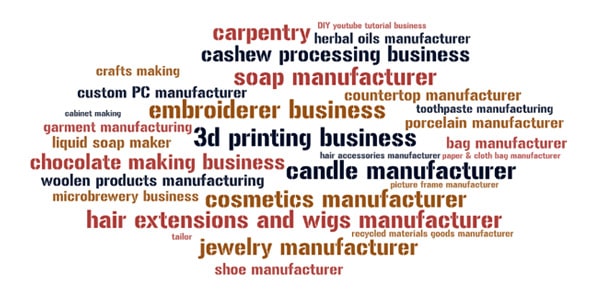
Here are a few entrepreneurship business examples: 3d printing business, candle manufacturer, embroiderer business, cosmetics manufacturer, soap manufacturer, hair extensions and wigs manufacturer, carpentry, jewelry manufacturer, tailor, porcelain manufacturer, bag manufacturer, shoe manufacturer, herbal oils manufacturer, microbrewery business, garment manufacturing, crafts making, DIY youtube tutorial business, toothpaste manufacturing, cashew processing business, chocolate making business, recycled materials goods manufacturer, cabinet making, picture frame manufacturer, liquid soap maker, woolen products manufacturing, paper & cloth bag manufacturer, hair accessories manufacturer, custom PC manufacturer, countertop manufacturer.
10. Entrepreneurship business examples for the tourism type:

A tourism entrepreneur is someone who comes up with innovative ideas to promote tourism and attract visitors. They are often involved in the planning and development of new tourist attractions, as well as marketing and advertising campaigns to get people interested in visiting these places. Tourism entrepreneurs need to be very creative and have a good understanding of what people want to see and do on vacation. They also need to be good at networking and building relationships with other businesses in the tourism industry.
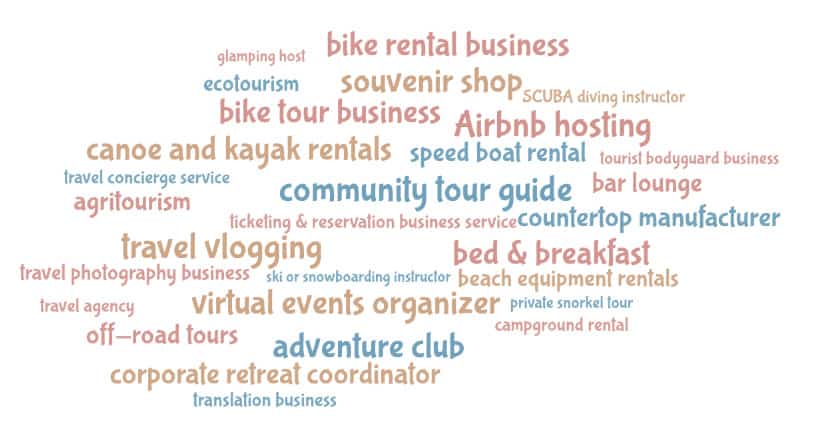 Here are a few examples of entrepreneurship businesses: community tour guide, travel vlogging, Airbnb hosting, virtual events organizer, souvenir shop, adventure club, bed & breakfast, canoe and kayak rentals, ecotourism, agritourism, bar lounge, off-road tours, travel photography business, ticketing & reservation business service, translation business, travel agency, glamping host, travel concierge service, bike rental business, bike tour business, campground rental, private snorkel tour, tourist bodyguard business, speed boat rental, corporate retreat coordinator, ski or snowboarding instructor, SCUBA diving instructor, beach equipment rentals.
Here are a few examples of entrepreneurship businesses: community tour guide, travel vlogging, Airbnb hosting, virtual events organizer, souvenir shop, adventure club, bed & breakfast, canoe and kayak rentals, ecotourism, agritourism, bar lounge, off-road tours, travel photography business, ticketing & reservation business service, translation business, travel agency, glamping host, travel concierge service, bike rental business, bike tour business, campground rental, private snorkel tour, tourist bodyguard business, speed boat rental, corporate retreat coordinator, ski or snowboarding instructor, SCUBA diving instructor, beach equipment rentals.
11. Entrepreneurship business examples in transportation:

A transportation entrepreneur is an individual who initiates, organizes, and manages a business venture in the transportation industry. A transportation entrepreneur is typically involved and has a lot of experience in activities such as shipping, logistics, warehousing, and distribution. Transportation entrepreneurs need to be well-versed in the various aspects of their chosen industry, from regulations to logistics. Transportation entrepreneurs often have a deep understanding of the transportation industry and are passionate about making it more efficient and effective. They are always looking for new opportunities to improve the way people and goods move around.
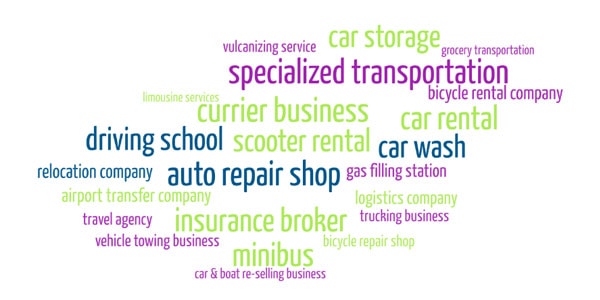
Here are a few entrepreneurship business examples: auto repair shop, currier business, specialized transportation, insurance broker, car rental, minibus, car wash, driving school, gas filling station, airport transfer company, bicycle rental company, relocation company, logistics company, vehicle towing business, travel agency, vulcanizing service, limousine services, trucking business, car storage, scooter rental, bicycle repair shop, grocery transportation, car & boat re-selling business.
12. Entrepreneurship business examples for the financial services type:

A financial services entrepreneur is someone who creates and provides innovative financial products and services that address the needs of consumers and businesses. Financial services entrepreneurs must be highly knowledgeable about the financial industry, have a lot of experience managing money and possess the ability to identify and exploit opportunities for profit. They must also be able to manage risk and handle the complex financial regulations that govern the industry.

Here are a few examples of entrepreneurship businesses: debt collection service, finance blogging business, tax preparation service, bookkeeping service, online financial courses developer, accounting and invoicing software developer, budget consultancy business, finance podcast, finance coaching business, real estate appraiser, stock market research website, credit repair business, business broker, auditing firm, mortgage/debt-reduction service, digital investment tools developer, digital banking business, personal finance management app developer, fintech consultant, digital wallet app developer, blockchain applications developer, bill reminder app developer. Additionally, we have already reviewed two budgeting apps. Our Truebill review tested its features, evaluating both good and bad aspects, and provided an honest assessment. Similarly, the Acorns review offered a thorough examination, highlighting its strengths and weaknesses in an unbiased manner.
13. Entrepreneurship business examples in construction & engineering:

Construction entrepreneurs typically start their companies from scratch, although some may purchase existing businesses. They typically build their businesses by bidding on and winning construction projects. Once they have a few projects under their belt, they can use their reputation, experience, and track record to attract new clients and grow their business. An engineering entrepreneur is someone who uses their engineering skills and knowledge to start and grow their own business. They are often innovators and problem-solvers and are able to see opportunities where others may not.

Here are a few entrepreneurship business examples: fireplace installations, ceramic tile retailing & installation business, waterproofing services, roof maintenance & repair, junk removal services, manufacturer of blocks and bricks, fencing, bricklaying services, electrical and light fitting, laminate floor installations, welding business, house repair services company, home renovation and remodeling, sprinkler system installation & repair, bathtub reglazing, CCTV installation services, chimney installation & repair, solar panel installation, window installation, construction estimation services.
14. Entrepreneurship business examples in the environmental & sustainability niche:

A sustainability entrepreneur is someone who creates and runs a business with the goal of promoting sustainable development. This can involve developing new technologies or products that are more environmentally friendly or finding ways to reduce waste and promote recycling. It can also involve working to raise awareness about environmental issues and encouraging others to adopt more sustainable practices. Sustainability entrepreneurs are often motivated by a desire to create a positive impact on the world, and they use their creativity and entrepreneurial skills to develop new products, services, and businesses that address environmental and social problems.

Here are a few examples of entrepreneurship businesses: handmade clothing, sustainable event planner, tiny home builder, farmers market vendor, sell water filters and purifiers, environmental law consultant, composting business, thrift store, environmental blog, bicycle tour operator, eco-friendly landscaping, urban agriculture, eco-friendly kids toys, reclaimed wood business, grow and sell your own food, upcycling, sell used books, reusable shopping bags manufacturer, urban garden planner, juice and smoothies bar, green cleaning business, minimalism training & consultant, grow and sell plants, mushroom farm, environmental fundraiser, car sharing service, recycling business, trash collection, packaging design business, sustainable fashion business, tech recycling business, efficient lighting supplier, biofuel production, electronics repair shop, eco-friendly retail business, worm farming fertilizer creation, green florist, eco friendly skin care products manufacturer, carbon offsetting dealer, clothing rentals, sell vintage clothing, green franchise.
Conclusion:
If you need more motivation to start an entrepreneurship venture (besides the entrepreneurship examples above), you could do the following:
- Read stories or watch documentaries about other entrepreneurs and their journey. This can help you see what’s possible and get some ideas for your own business.
- Attend entrepreneurship events or meetups. This can help you network with like-minded people and learn more about what it takes to be a successful entrepreneur.
- Talk to people who have already started their own businesses. They can offer advice and insight into what it’s really like to be an entrepreneur.
While some people are born with natural entrepreneurial ability, anyone can learn the skills and knowledge needed to be successful in business. With the right mix of passion, determination, and hard work, anyone can be a successful entrepreneur!
